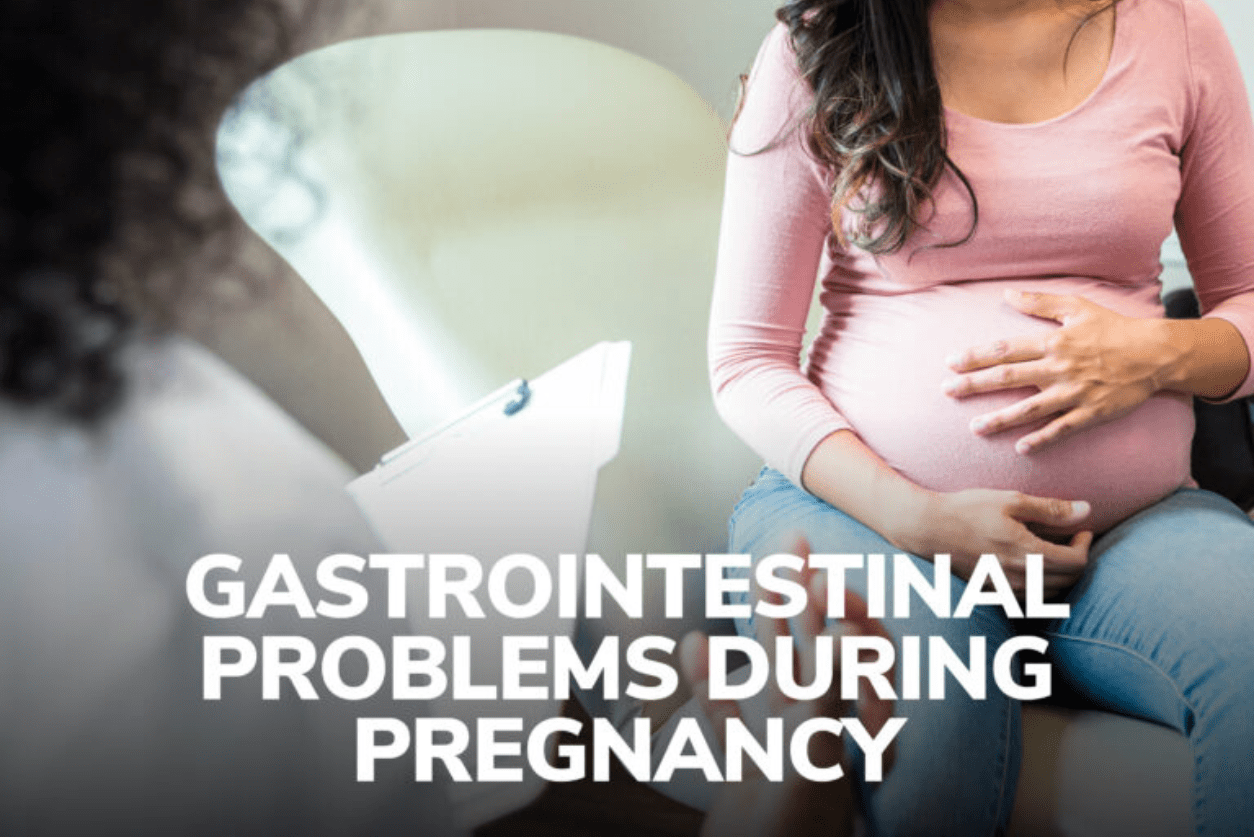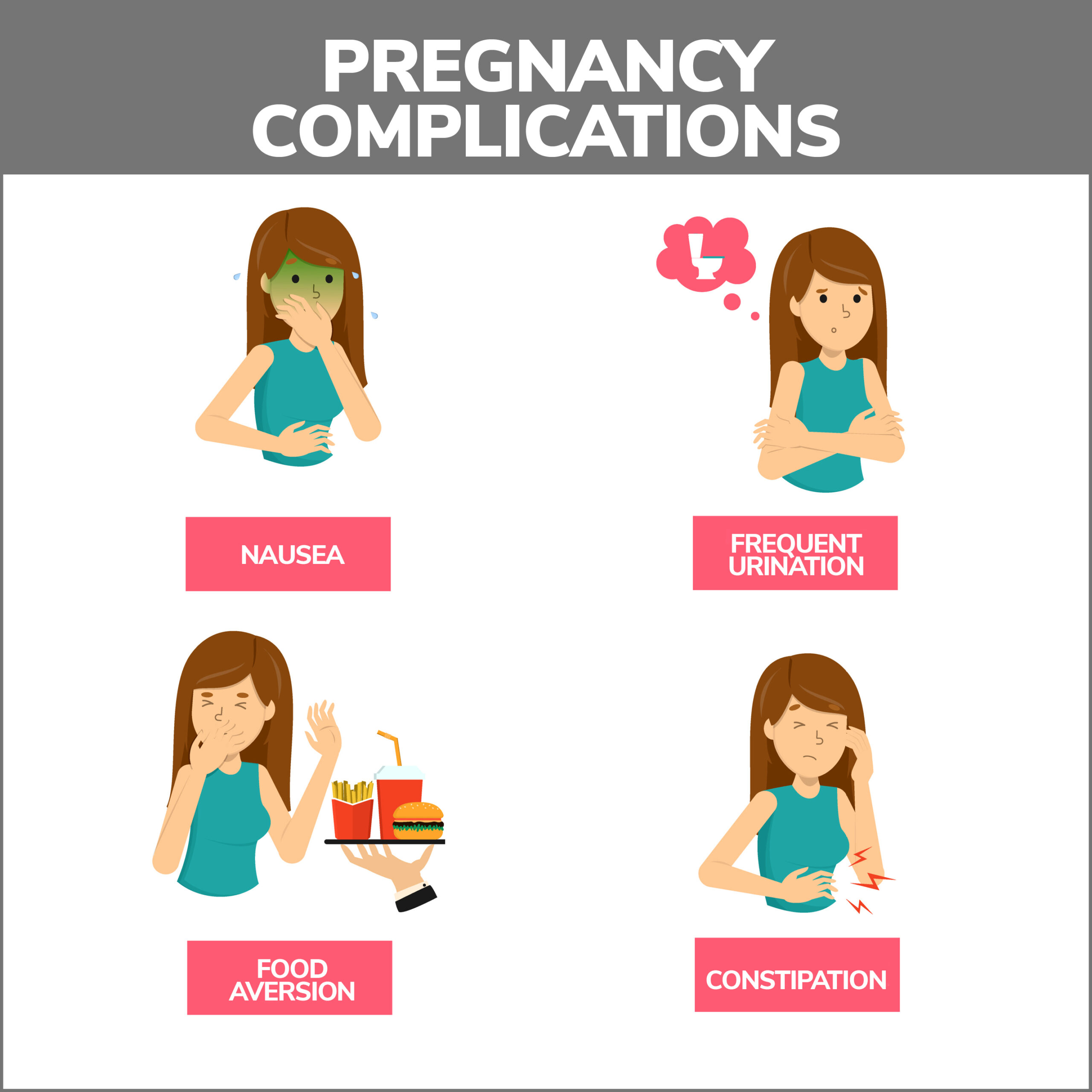
GI Problems During Pregnancy
Congratulations, you’re pregnant!
But you may also be experiencing discomfort from gastrointestinal (GI) issues. These are very common during pregnancy. Your baby may crowd your stomach, intestines, and esophagus as it grows, affecting their function. Hormonal fluctuations can also interrupt normal GI performance. Some women have GI problems that develop after becoming pregnant, while others have pre-existing gastric disorders that worsen during pregnancy.

So, let’s look at some of the issues you should be aware of.
What Gastrointestinal Problems Can Develop When You’re Pregnant?
1. Nausea and vomiting
Better known as morning sickness, nausea and vomiting are probably the most well-known symptoms of pregnancy.
Contrary to the name, morning sickness can happen at any time of day or night. It’s the earliest symptom, usually occurring between the first six to eight weeks. The nausea isn’t always accompanied by vomiting.
Hormonal changes are thought to trigger morning sickness. An increase in a hormone called the human chorionic gonadotropin, or hCG (which helps form the placenta), is the leading cause of morning sickness. Elevated levels of the hormones estrogen and progesterone may also play a role.
It can be triggered by certain odors such as perfume (since your sense of smell is heightened when you’re pregnant), bright lights, television, riding in a car, toothpaste, and foods – even ones you liked before. Sometimes there are no triggers.
2. Hyperemesis gravidarum
Hyperemesis gravidarum (HG) is intense, uncontrollable nausea and vomiting that can lead to loss of up to 5% of weight, electrolyte imbalance, severe dehydration, and other extreme symptoms.
Unlike morning sickness, during which nausea is sometimes accompanied by vomiting, nausea caused by HG is always accompanied by severe vomiting. It never subsides, can cause severe dehydration, and prevents you from keeping food down. If you suspect you have HG, contact your doctor, as many of its symptoms can jeopardize your health and pregnancy.

3. Constipation
As your baby grows and your uterus expands, it puts pressure on the rectum and lower intestine, causing constipation. Although constipation can happen during all three trimesters, it is most common during the third trimester, when the baby is heaviest and presses hardest against your bowel.
Constipation can also be worsened by excess production of the hormone progesterone. Progesterone relaxes your intestines and slows down the passage of stool. This allows more time for water to be removed from your bowel movement, making it hard and difficult to pass. The hormone estrogen can also have the same effect. Prenatal vitamins and iron supplements can cause constipation, as well.
4. Hemorrhoids
Hemorrhoids are painful, itchy, swollen veins inside and around your anus. When you have constipation and are straining to pass a bowel movement, it can cause these veins to bulge. Pressure from the growing baby and increased blood volume in the pelvic region can also contribute to hemorrhoids. Changing hormones may play a role too. Pushing during labor can aggravate hemorrhoids, as well. About 50% of pregnant women have hemorrhoids.
One way to relieve hemorrhoids while pregnant is by alleviating constipation: eat a high-fiber diet, and drink plenty of fluids.
Hemorrhoids are particularly common during the third trimester. Hemorrhoids usually disappear after delivery.
5. Heartburn
During the third trimester, more than half of pregnant women experience heartburn, also called gastroesophageal reflux disease (GERD). It mainly affects women who have had heartburn before pregnancy and women who have been pregnant before. Contrary to its name, heartburn doesn’t affect your heart.
Rising hormone levels can cause heartburn. These hormones can slow digestion, making food move more slowly through your GI tract. This leads to heartburn and bloating. Your growing baby may also squeeze your stomach, causing stomach acid to flow back into your esophagus.
Shifts in progesterone levels can also cause your esophageal sphincter to relax. The esophageal sphincter is a band of muscle located where the stomach joins the esophagus. When it relaxes, food and stomach acid may backflow into your esophagus and mouth.
6. Gallstones
Gallstones are hardened pieces of bile that develop in your gallbladder. Bile is a digestive fluid produced in the liver and stored in the gallbladder. It’s made of bile salts, water, and cholesterol. Gallstones can form if the bile contains too much cholesterol and too little bile salts.
Gallstones can be as small as a grain of rice or as large as a golf ball. Some people only develop one, while others have many at once. Often, gallstones don’t have any symptoms and don’t need treatment. A gallstone lodged in a bile duct can provoke infection and extreme pain.
Elevated levels of estrogen during pregnancy increase cholesterol secretion. Simultaneously, increased progesterone production causes the body’s muscles to relax, slowing down the release of bile. Together, these hormonal changes can lead to the formation of gallstones.
7. Diarrhea
Diarrhea is a condition in which you have three or more loose or runny stools within 24 hours. It’s uncomfortable but not usually serious, clearing up in several days. When you’re pregnant, diarrhea is more common during the third trimester. During this trimester, diarrhea may be a sign that labor is near but not imminent. There are three types of diarrheas:
- Acute – This is the most common type of diarrhea. It usually resolves after several days and doesn’t need any special treatment.
- Persistent – Persistent diarrhea lasts two to four weeks.
- Chronic – Chronic diarrhea lasts more than four weeks or comes and goes for a long time.
Diarrhea during pregnancy can have three causes:
- During pregnancy, you may develop sensitivity to certain foods. These aren’t necessarily foods you don’t eat. They can be the ones you regularly eat, but eating them during pregnancy can cause diarrhea.
- You may make sudden dietary changes to ensure your baby is adequately nourished. This sudden change in food may trigger diarrhea.
- When you’re pregnant, hormonal changes can lead to diarrhea.
8. Bloating
Bloating is an accumulation of gas in your stomach and intestines. When you’re bloated, your belly feels tight and hard to the touch. It’s often accompanied by excessive gas, cramps, and constipation. These symptoms can be mild or very uncomfortable.
Extra progesterone released during pregnancy causes the GI tract to relax, slowing digestion. This allows nutrients from your food to have more time to reach your baby. The downside is that slower digestion can make you feel bloated or cramped.
Bloating typically occurs around week 11 and can last until you give birth.
9. Frequent Urination
Frequent urination is a common pregnancy symptom. It’s linked to the increased blood in your uterus. Your kidneys need to produce more fluids to process this elevated blood flow. These fluids are retained in your bladder.
The pressure of your uterus on your bladder can also cause you to pee more often.
Frequent urination can start as early as the first few weeks of pregnancy and increase as your uterus presses against your bladder.
No specific number of bathroom trips qualifies as frequent. Frequent urination is only the need to urinate more than you usually do.
What contributes to the need to urinate often when you’re pregnant?
- Although your kidneys remove waste more efficiently to protect your baby, your bladder will refill more often, so you’ll need to pee more frequently.
- When you’re pregnant, the volume of blood in your body doubles. This means there will be more liquid for your kidneys to handle.
- During pregnancy, hormonal shifts will loosen and soften your urethra’s ligaments, and you’ll be less capable of holding your urine.
- As your growing baby presses against your bladder, there is less room for urine, prompting an urge to use the bathroom more often.
- When your baby drops into your pelvis at the end of pregnancy, it will put even more pressure on your bladder, triggering the need to pee more urgently.
- During sleep, your body absorbs fluid from your legs, increasing the urge to urinate. This is particularly true if your feet and lower legs are swollen. Your legs and torso are at the same level when you’re lying down. Since it’s no longer fighting gravity, your blood more easily transports fluid retained during the day to your bladder.
Contact Us
Pregnancy is a joyous time! It’s also a time when you may be troubled by GI problems. If they’re stealing your joy, let’s talk!
Our practice began more than 15 years ago and has emerged as one of the leading gastroenterology practices in central Florida. We perform various diagnostic procedures using state-of-the-art equipment in a friendly, comfortable, and inviting atmosphere where patient care is always a top priority. Contact us today!